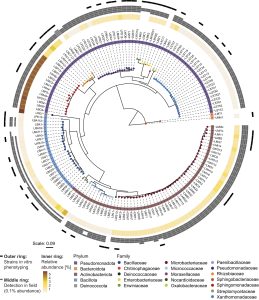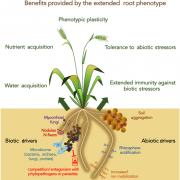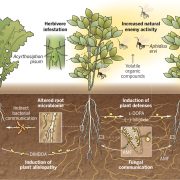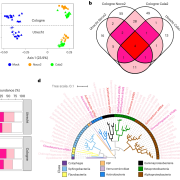Bacterial tolerance to host-exuded specialized metabolites structures the maize root microbiome
Benzoxazinoids (BXs) are alkaloid specialized metabolites produced by important crops like maize. Their role in shaping the root and rhizosphere microbiomes and in plant defense against pest and pathogens is well known, although the mechanism remains unknown. One of the major BXs produced by maize is DIMBOA-Glc, which is rapidly converted to MBOA in the rhizosphere and can suppress growth of many bacteria. Thoenen et al. found that these plant metabolites act as highly selective anti-microbials, with gram-positive bacteria such as Bacillaceae being more tolerant to MBOA than gram-negative bacteria (Xanthomonadaceae and Rhizobiaceae), revealing that cell wall properties are important for bacterial tolerance to BXs. The authors further examined responses of bacteria isolated from both host (maize) and non-host (Arabidopsis) plants, and found that even within the same taxonomic group, the maize root bacteria were more tolerant to MBOA. The authors systematically determined the tolerances of maize root bacteria to BXs and found that tolerance to MBOA correlated significantly with their abundance on BX-exuding roots. This study provides evidence that bacterial tolerance to plant specialized metabolites or to root-derived microbials is key to understanding characteristic root microbiome composition and its abundance in host plants. (Summary by Indrani Kakati Baruah, @Indranik333) PNAS 10.1073/pnas.2310134120










